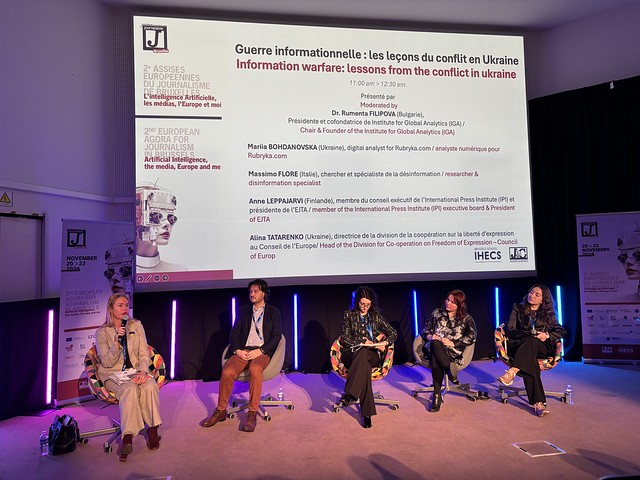With Marriia Bohdanovska, digital analyst for Rubryka.com; Massimo Flore, researcher & disinformation specialist; Anne Leppajarvi, member of the International Press Institute (IPI) executive board & President of EJTA and Alina Tatarenko, Head of the Division for Co-operation on Freedom of Expression – Council of Europe. Moderated by Dr. Rumenta Filipova, Chair & Founder of the Institute for Global Analytics (IGA).
Key issues
More than 1,000 days of Russia’s invasion in Ukraine, fake news, toxic narratives and disinformation are spreading. Before social media, the new spreaders were easily identified, people knew who to trust. Nowadays, everyone can produce news: they are called the “players”. We don’t know anymore if what we see is fake news or not, if we don’t do further research. Social media are concerned about three compliances: illegal content, disinformation and algorithm.
What they said:
Marriia Bohdanovska: “We make them aware of possible manipulation.”
Massimo Flore: “The DSA [Digital Service Act] was established because it was a need.”
Anne Leppajarvi: “Free press is disappearing.”
Alina Tatarenko: “An attack on journalists is an attack of democracy.”
“The sooner your start, the soon you can win this war.”
Takeaways
Russia’s propaganda and restrictions to the press show us the price of press freedom. Unfortunately, other threats are to be seen in European countries: the Council of Europe is concerned about Hungary. Press freedom is falling away as time goes on or journalists are the holders of democracy. In these countries, disinformation is spreading more. However, media and journalists can do a lot to cover disinformation like fact checking, exposing the lies, promoting credible journalism, and promoting public debate (freedom of expression, importance of the truth). They need to use everything in their toolboxes to fight it. Europe is supporting media and independent actors to win the war of disinformation which is a threat to our democracy and security. The debate comes to an end with hope and optimism.
Delphine Grote (IHECS)
